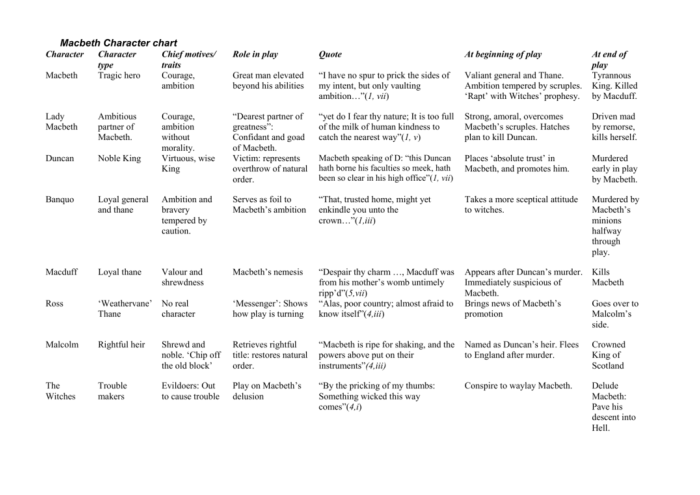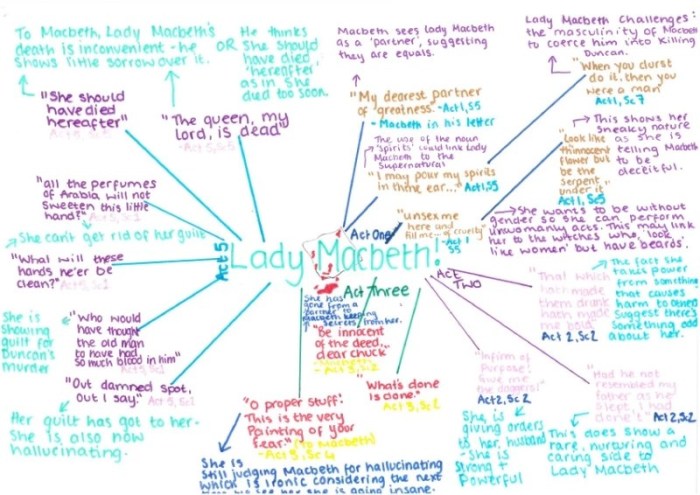Lady Macbeth Character Analysis PDF: Embark on an in-depth journey into the psyche of one of Shakespeare’s most iconic and complex female characters. This comprehensive analysis delves into her motivations, actions, and the profound impact she has on the play’s tragic events.
Lady Macbeth’s character is a captivating blend of ambition, ruthlessness, and psychological turmoil. Her influence on Macbeth’s actions and the play’s plot is undeniable, making her a central figure in the exploration of power, guilt, and the human condition.
Character Analysis of Lady Macbeth

Lady Macbeth, a complex and enigmatic character in William Shakespeare’s play “Macbeth,” is a woman of great ambition and ruthlessness. Driven by a desire for power and the fulfillment of her husband’s destiny as king, she plays a pivotal role in the play’s tragic events.
Lady Macbeth’s character is marked by her strong will and determination. She is not a passive observer but an active participant in her husband’s schemes. Her ambition is not for herself but for Macbeth, and she is willing to go to great lengths to help him achieve his goals.
Psychological Makeup
Lady Macbeth’s psychological makeup is complex and multifaceted. She is a woman of great intelligence and cunning, but she is also prone to fits of madness and despair. Her ambition is driven by a deep-seated insecurity and a desire to prove herself.
Lady Macbeth’s relationship with Macbeth is central to the play. She is his confidante and his accomplice, but she is also his superior in many ways. She is more ambitious and ruthless than Macbeth, and she often pushes him to do things that he would not otherwise consider.
Lady Macbeth’s Role in the Play
Lady Macbeth serves as a pivotal catalyst for Macbeth’s descent into darkness and the ensuing tragic events that befall him. Her influence extends far beyond the initial temptation, shaping the plot and leading to the ultimate downfall of both herself and her husband.
As a Catalyst for Macbeth’s Actions
Lady Macbeth’s ambition and ruthless determination ignite the spark within Macbeth, encouraging him to seize the crown he believes is rightfully his. She manipulates his insecurities and ambition, planting the seeds of doubt that ultimately lead to his betrayal of Duncan.
Her relentless pressure and unwavering support provide the impetus for Macbeth’s fateful decision to murder the king.
Influence on the Plot and Tragic Events
Lady Macbeth’s influence extends beyond Macbeth’s initial actions. Her involvement in the murder of Banquo and Macduff’s family deepens the web of deceit and violence that envelops the play. Her guilt and paranoia manifest in sleepwalking episodes, foreshadowing the tragic consequences of their actions.
Consequences and Downfall
Lady Macbeth’s actions ultimately lead to her own destruction. The guilt and psychological torment she endures consume her, driving her to madness and ultimately to her death. Her demise serves as a grim reminder of the devastating consequences of unchecked ambition and the corrosive effects of guilt on the human soul.
Lady Macbeth’s Language and Symbolism

Lady Macbeth’s language is a powerful tool that reveals her inner thoughts and motivations. Her use of imagery, metaphors, and other literary devices creates a vivid and complex portrait of a woman driven by ambition and a thirst for power.
The symbolism associated with Lady Macbeth also adds depth and meaning to her character, highlighting the play’s themes of guilt, ambition, and the destructive power of evil.
Lady Macbeth’s Language
Lady Macbeth’s language is often forceful and assertive, reflecting her strong will and determination. She frequently uses imperatives, such as “Come, you spirits” and “Infuse me with thy strength,” to express her desires and ambitions. Her use of imagery and metaphors is also striking, creating a vivid and visceral picture of her inner world.
For example, she describes her husband as a “milk-liver’d man” and her own determination as a “deed of dreadful note.” These images and metaphors reveal her contempt for weakness and her willingness to do whatever it takes to achieve her goals.
The Symbolism of Lady Macbeth
The symbolism associated with Lady Macbeth is also significant. Her association with blood and darkness highlights the play’s themes of guilt and the destructive power of evil. The sleepwalking scene, in which she obsessively washes her hands, is a powerful symbol of her guilt and the inability to escape her crimes.
The image of the “blood upon her hands” is also a potent reminder of the consequences of her actions.
Lady Macbeth in Cultural Context

Lady Macbeth is a complex and multifaceted character who reflects the societal norms and expectations of her time. She is a powerful and ambitious woman who is driven by her desire for power and control. However, she is also a victim of the patriarchal society in which she lives, which limits her opportunities and restricts her ability to express herself.
Comparison with Other Female Characters
Lady Macbeth is often compared to other female characters in Shakespeare’s plays, such as Ophelia from Hamlet and Desdemona from Othello. These characters are all complex and tragic figures who are victims of the patriarchal society in which they live.
However, Lady Macbeth is unique in her ambition and her willingness to use violence to achieve her goals.
Critical Interpretations of Lady Macbeth

Lady Macbeth has been the subject of numerous critical interpretations, each offering a unique perspective on her character and motivations. Some of the most influential interpretations include:
Psychoanalytic Interpretations
Psychoanalytic critics view Lady Macbeth as a complex and troubled individual whose actions are driven by unconscious desires and conflicts. Sigmund Freud argued that Lady Macbeth’s ambition and ruthlessness stem from a deep-seated penis envy, while other psychoanalysts have suggested that she suffers from a form of hysteria or psychosis.
- Strengths:Psychoanalytic interpretations provide a rich and nuanced understanding of Lady Macbeth’s inner life, offering insights into her motivations and behavior.
- Weaknesses:These interpretations can be overly speculative and rely heavily on subjective analysis, making it difficult to verify their claims.
Feminist Interpretations
Feminist critics have explored the ways in which Lady Macbeth’s character reflects and challenges prevailing gender norms. Some feminists view her as a victim of patriarchal society, while others see her as a powerful and transgressive figure who defies traditional gender roles.
- Strengths:Feminist interpretations provide valuable insights into the gender dynamics of the play and offer a more nuanced understanding of Lady Macbeth’s agency.
- Weaknesses:These interpretations can sometimes oversimplify Lady Macbeth’s character and reduce her to a symbol of feminist oppression.
Postcolonial Interpretations
Postcolonial critics have examined Lady Macbeth’s character in relation to the play’s colonial context. They argue that her ambition and ruthlessness reflect the destructive effects of colonialism on both the colonizers and the colonized.
- Strengths:Postcolonial interpretations offer a fresh perspective on Lady Macbeth’s character and provide insights into the play’s broader political and historical context.
- Weaknesses:These interpretations can sometimes be overly simplistic and reduce the play to a mere allegory of colonialism.
Evolution of Lady Macbeth’s Characterization, Lady macbeth character analysis pdf
Lady Macbeth’s characterization has evolved significantly over time. In early performances, she was often portrayed as a monstrous and evil figure, but more recent interpretations have sought to humanize her and explore the complexities of her motivations.This evolution reflects changing cultural attitudes towards women and mental illness, as well as the increasing sophistication of theatrical performance.
Lady Macbeth remains a fascinating and enigmatic character, whose complexity and ambiguity continue to inspire critical interpretation.
Questions and Answers: Lady Macbeth Character Analysis Pdf
What is the significance of Lady Macbeth’s sleepwalking scene?
Her sleepwalking reveals her inner turmoil and guilt, as she relives the horrors she has committed.
How does Lady Macbeth’s relationship with Macbeth evolve throughout the play?
Initially driven by ambition, their relationship becomes strained as guilt and paranoia consume them.
What are the key psychological traits that define Lady Macbeth?
Ambition, ruthlessness, and a deep-seated insecurity.